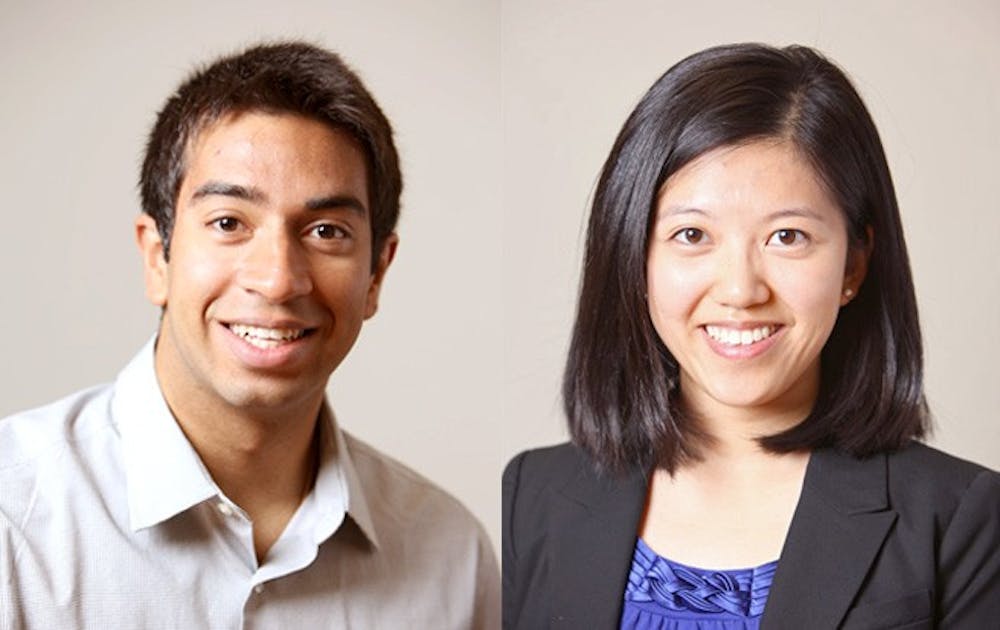Two Duke juniors, Kushal Seetharam and Yaohua Xue, have been selected to receive the 2013 Barry M. Goldwater Scholarship. The award is given to selected scholars based on academic merit in mathematics, science and engineering. Seetharam is an Angier B. Duke scholar studying electrical and computer engineering, and Xue is a chemistry and economics double major. The Chronicle spoke with both scholars about receiving the award and about their research.
The Chronicle: What does it take to be a Goldwater Scholar?
Kushal Seetharam: Primarily two things. One is you have to be really interested in the work you’re doing. You have to be really passionate about it. It should be something you would procrastinate doing other homework to work on this. The second thing is great mentorship. Without the professors I worked with taking an interest in me, I could not have progressed as much as I have.
TC: What kind of research do you do?
KS: I’ve worked in a few different fields of research. In high school I did biochemistry research on nerve agents. At Duke, I started out doing computer architecture research with [electrical and computer engineering professor] Dr. Daniel Sorin. I then started getting more interested in physics and I began working with [ECE professor] Dr. David Smith on applications of metamaterials in invisibility cloaking and wireless energy transfer.
TC: How did you first get started doing this kind of research?
KS: I started getting more interested in physics after I got to college. I especially liked electromagnetics because it was very visual and clean. I had a previous interest in wireless energy transfer and I read an article that one of the researchers in Dr. Smith’s lab had recently published in a paper about metamaterials and wireless energy transfer. I contacted him and got involved in that project and have been working with him for about a year now.
TC: What was the hardest problem you faced during your time doing research?
KS: The hardest problem was getting over the misconception that I need to take classes to learn more before I do research. The truth is, no matter how many classes you take, you’re never going to learn enough. The only way to get better at something is to start doing it. You pick stuff up as you go along while trying, failing and eventually succeeding.
TC: What was your most defining or accomplished moment in your research experience?
KS: About a month ago, one of the projects I was working on, they had designed the metamaterial before I started working on the project, fabricated it and tested it in an experiment for what it was meant to do, and the simulation that they designed for it and the experiment weren’t fully matching. So I used a different approach to the simulation that I had been working on before to investigate the same thing. I was able to show some of the characteristics that matched better with the experiment. That was really cool for me. Being able to do something used to see those two match was really rewarding.
TC: What do you plan to do in the future?
KS: I plan to get a Ph.D. in applied physics. After that, I’m not quite sure. I could either see myself going into industry to work on novel applications and inventions or going into academia. I’ll figure that out when I’m doing my Ph.D.
The Chronicle: What does it take to be a Goldwater Scholar?
Yaohua Xue: To me, it’s just people who are very passionate about research in general, I guess more specifically in the science, engineering or math fields. That’s one of the main criteria—having a passion for research.
TC: How would you describe the research they took into consideration when they gave you this award?
YX: I’m working in a biochemistry lab, and the past project I’ve been working on is involved with the DNA repair pathway. What we are looking to do is the first part of the process where we solved several structures of several proteins of those pathways, and right now we are trying to find an inhibitor of this pathway that’s been implicated in the research. We are looking for inhibitors of this pathway to enhance the effects of current chemotheraputics to treat cancer.
TC: How did you get started with that research? What brought you into that particular field?
YX: Sophomore year I was looking to do work in a biochemistry lab, and I specifically contacted [Pei Zhou, associate professor of biochemistry], and he paired me up with this graduate student who was working on his project so that’s how I ended up working on this project.
TC: What was the hardest problem you faced while doing your research?
YX: Some of the most difficult parts for me is that sometimes I get frustrated that things don’t work out or that you don’t get the data you expect. But I guess the important thing is to always figure out a new way to approach the problem and try to figure out what went wrong and try to go forward from there. We had to figure out how to fix it and just go.
TC: What was your most defining or accomplished moment in your research experience? What was a big turning point for you?
YX: When I got to work on pieces of the project on my own and contributed to the overall project. I was really proud that I made the experiment work and got really good data.
TC: What do you plan to do in the future?
YX: I will be applying to an M.D./Ph.D. program, and I’m looking to do research in pharmacology, designing molecules that target each pathway to help treat diseases.
Get The Chronicle straight to your inbox
Signup for our weekly newsletter. Cancel at any time.

